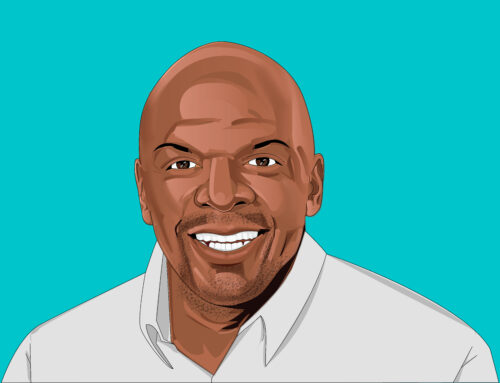Enter your information below to sign up to receive alerts on new interviews!
Welcome to Jonathan Meyrowitz who joins us for our Talent Chronicles series! Jonathan has a distinguished background and is early-on into an illustrious career as a leader in the recruitment field. Jonathan has served as the previous Head of Talent Acquisition for CAA, Forever21, and MedMen.
JCSI: Hey everybody, this is Bergin Sullivan here with JCSI. I’m here today with Jonathan Meyrowitz, joining us for an interview in our Talent Chronicles series – thanks so much for joining us here today! I know you’ve been a leader in Talent Acquisition for quite some time now, especially your experience as Head of Global Talent Acquisition at Forever 21. Do you want to give us a quick background on your work experience? Maybe tell us kind of how you got into talent acquisition?
Jonathan: Sure! First, thanks for having me today, I appreciate it. Like most people, I got into Talent Acquisition by falling into it. I was a previous touring musician, drummer, keyboardist, and programmer for about five years. I also did Tour Finance for Sony and SIR Studios for another five years. At the end of that time frame, the music industry wasn’t doing so great and I was looking for a new career by doing some office management and accounting work for some studios, but I really wasn’t enjoying myself. I went in for an interview at Robert Half for another studio that was looking for an office manager when one of the recruiters pulled me aside and said ‘I think you’d do really good in this if you wanted to give it a try.’ I was looking for a more corporate career change, I was getting a little older into my late 20s and, you know, really wanted a career.
So, I started at Robert Half and was there for two and a half years in their accounting and finance premier placement and consulting placement firm. It was a lot of fun, you learn a lot, but it’s pretty hard work. Kind of like working in a bulge bracket or working at Deloitte, it’s long hours, and some of the calls can get pretty long. So, I really wanted to move internally. I knew that was where I was going to have more longevity in my career where I really could learn more about business in general. As opposed to working with many businesses, I really wanted to get under the hood of one. I had a great opportunity to lead Direct Sourcing and Recruitment for the Accounting, Finance & IT departments with a previous client I worked with at Robert Half, who brought me on board as a senior recruiter. From there, I was very fortunate to work directly with the Cheng family, the previous owners of Forever 21. They gave me some really great opportunities where I was able to staff their multiple C-level and Vice President opportunities, including our previous CFO and a few of our IT leadership. Our Real Estate leadership really gave me a full G&A recruitment skill set on top of it, which can be used across the board, not only for E-comm but also on the internal and infrastructure IT side for, you know, 750 stores.
But, as I mentioned, my background was in entertainment and I really wanted to get back into entertainment. So when CAA reaches out and asks you to leave their talent for their biggest office in Los Angeles, of course, you have to really consider that opportunity. Yeah, it was really great to work there. But as you might be able to tell from my personality, Bergin, I’m quick-moving and I want to get things done. A company like CAA, although extremely prestigious is, you know, very slow-moving when it comes to more the business operations side. So, as I mentioned, I hired our CFO for Forever 21 and he eventually moved on and became the CFO of MedMen. At that point, when the biggest (at that time) startup in Los Angeles reaches out and wants to be their Head of Talent in a really interesting industry, that is doing extremely great things for the community, you take the opportunity. It’s been so great to work in multiple industries, and it’s just been an awesome experience in just a short amount of time of not even seven years.
JCSI: Yeah, that’s really great! So, Talent Acquisition can obviously mean a lot of different things to different people depending on what industry you’re in and what the company culture is like. How do you see the role of Talent Acquisition and what it means to you within the different organizations and positions you’ve been in?
Jonathan: That’s a really great question. You’re the first point of contact, and really need to drive company culture. I think recruiting teams really need to partner with Marketing & PR because you’re that first point of contact for a potential employee. You really have to drive that relationship. I think that Talent Acquisition is viewed as a very HR-driven role where clients don’t partner much with HR. I see Talent Acquisition as more of an Operations role as opposed to an HR role because even if you’re managing a team of six recruiters, you’re really the only person other than maybe the CEO that’s aware of every single project and really driving the business. I can’t think of another leader that typically knows what every department is currently working on, whether it’s an implementation or sales or whatever E-comm project is going at a micro-level. So, I find myself working more across the board with Operations, Marketing, Finance, and PR. Less with my HR teammates unless we’re talking about compliance-driven metrics, reporting and dashboards for diversity, inclusion, and things like that.
JCSI: Sure, and just going off of that on the operations side, what different types of technology do you see? Are there any automation technologies coming up that might help accelerate parts of that work?
Jonathan: I’m a person who believes in tooling, but not over-tooling. I believe that if you have a very solid open-source ATS that’s doing automated interview scheduling, automated offer letters, working with an onboarding system, and an HRIS system that can automate the onboarding process, you really can take advantage of it. That being said, I do sit on Calendly’s customer advisory board, and Calendly is working on an amazing tool (we can talk more about down the line) that should be coming out very soon. Whether you’re an individual or a company, they’ve always created a very easy-to-use interface for the user, and I’ve always been a fan. There are some really interesting tools on that side.
I also really think that there’s going to be a lot more automation within the actual rec opening process. Too many times in my career have I seen recs that either open incorrectly, not listing their compliances, listing too many compliances or questions that a candidate doesn’t have to answer. As many people in our industry know, you want to quicken that application process and expedite it. So, I think that there’s going to be a lot of tools out there, whether it’s AI that goes through Slack or Teams to help open that rec process and automate it. So that understanding compliance can help to make that application process as expedited as possible.
JCSI: Alright, cool! I know you kind of just briefly went into this, but do you have a different explanation for your take on this trend toward recruitment automation? I know its kind of a hot topic these days, and how this might affect Talent Acquisition for specifically retail hiring down the road?
Jonathan: Sure! It’s no secret that post-COVID in our industry, Talent Acquisition is typically the first to see cuts in costs, you know when we’re a cost center as opposed to a revenue driver. So, it is important to automate tasks like opening requisitions at a massive scale through 750 stores on a retail level because you’re not going to have that support from coordinators to schedule interviews and to post roles. You’re really going to see a lot of people utilizing automation to perform a lot of those tasks, whether it’s AI or whether it’s dealing with shared services. So, I believe you’re going to see a lot of automation there.
Another trend that I’ve also been seeing from my recent job search, is that you’re seeing a lot of companies consolidating HR duties within higher-level roles. A lot of the opportunities that I’ve been interviewing for have asked me to create completely separate talent management and learning a development guide as a follow up to my resume, going over some of the L&D projects that I’ve led, and training recruiters and HR professionals at a national and global level. That’s another huge trend I’m seeing as, unfortunately, post COVID, a lot of HR departments, since they’re seen as a cost center, and are definitely consolidating.
JCSI: Right, that’s interesting. Maybe we could go into a little bit about the talent management industry, and Talent Acquisition there. That must have been a pretty unique and kind of defining experience. What do you have to say about that experience?
Jonathan: You know, CAA is an extremely prestigious company, and I will say that I don’t think I ever felt that I’ve been surrounded by smarter people than when I worked there. It was fantastic, they’re on the cutting edge of everything and treat their clients unbelievably well. You really are brought into very interesting conversations just by walking around the halls. So, it was a great experience. That said, I really do like to be in environments that are looking to innovate, especially within an HR function. Especially during my tenure, there was a lot of things going on whether it was the end of the Weinstein era, whether it was the strike that was about to happen with the writers, there were a lot of things that didn’t make some of the more business operations like Finance or HR the main concern. Now, of course, HR at the post-Weinstein era is going to be an extremely important area, and they definitely cover their bases. Even starting the Time’s Up movement internally within CAA and had amazing foundations that really made sure people felt empowered to report any wrongdoings. That being said, there were a lot of things from a technology standpoint that we weren’t really looking to automate and move forward with, I felt like we were an extremely manual process.
So, I’m always under the mindset that if you’re not innovating, you’re falling behind. Working with some closed-source ATS like a Workday, you’re really not going to get to where you want to go especially as I mentioned, you have to be multifaceted. You need Talent Management, L&D, ATS implementation, and SaaS tool implementation, and marketing background as people are really looking for recruiters to do a lot of things. So, I feel like it was important from there to make a move and then move into an industry like MedMen that was doing extremely innovative things from an external standpoint, customer-facing standpoint, and an internal standpoint, it was a truly remarkable but shorter experience.
JCSI: That’s definitely something to keep an eye on. Going a little bit back into the retail industry, kind of talking about the quality of hires there. How are you able to predict a successful hire in that industry? I mean, you could have employees that are going to be on the front lines, and they could be the first point of contact for a customer. How can you ensure that they’re portraying the corporate brand? I know you had mentioned several stores, so how can you take that from location to location?
Jonathan: I think it’s extremely important that you have a strong LMS and retail leader who’s willing to push that LMS. If you’re not educating your employees at that retail level, on a day-to-day basis through morning & night meetings, especially in an industry like MedMen where things are changing. Regulations are changing so quickly; you’re going to get left behind. So, not only do you have to have that LMS that’s being updated by not only your retail team, but also vendors, and you need a retail leader who’s going to push that and make it a priority. But, from an employee standpoint, when we look at people, whether it was a Forever 21 at MedMen, it’s always a willingness to learn that LMS, or just a willingness to learn a process, and bringing that knowledge and drive that if they do well here, that’s not the last stop.
I’ve always seen that retail companies who do extremely well pull their stores into corporate, whether it’s an In-N-Out or a Trader Joe’s, you never see those resumes in California on the market because people never leave there. I think those two companies are models of companies that do extremely well from a retail experience, even though it’s more of a different industry, but still consumer-facing. Those are great models of people who are really embedded in their culture at a retail level, or store level, that this isn’t the last stop if you do well in your current position.
JCSI: That’s a great point and not something that an initial employee would have as a mindset when they first go out for that job as a store associate. Just as a final question here, how do you see the recruitment industry as a whole, and Talent Acquisition, expanding over time as things start to change?
Jonathan: As I mentioned earlier, you’re going to see a lot of consolidation within internal HR departments, so you’re a Marketing Exec, a PR Exec, and an Operations Executive when you’re the Head of Talent. But now you’re going to be an LNB may have to take on benefits is, you’re going to see a lot of consolidation. That’s what I see from an internal perspective. As an industry as a whole, even though it’s counterintuitive, I think you’re going to see a lot more companies and tools focused on the job seeker post-COVID as opposed to the company. Most people would say that doesn’t make sense, because companies have more money at this point in time, they’re going to be the bigger customer at all times. But, if you told me as an executive that at $40 a month, you will never have to fill out an application again, and get dashboard analytics of your job search, what jobs you’ve applied to, how many people have applied and get real-time numbers, I would pay more of upwards $100 a month.
So, I think you’ll see a lot more tools geared towards the job seeker through more analytic based tools, more automated tools for the job seeker. For someone like myself, seeking a white-collar job, I would pay money to be able to spend more time with my kids and not be scrolling through multiple LinkedIn Boolean recruitment searches. It’s like I’m trying to find a candidate for my own jobs! I think that’s really important, and something where I see the Talent Acquisition and Recruitment industries moving forward.
JCSI: Interesting points! Any final thoughts or anything we didn’t cover that you’d like to share?
Jonathan: I always believe that it’s all about the process. I’ve gotten the question multiple times while I’ve been interviewing of ‘what would it be?’ and I always say, 80% process and 5% of everything else. Because, if you have the right process, you have the right automation, and create the right relationships around an internal company as an internal recruiter. You are going to be able to focus a lot less on the process moving forward, and just enhance all those other aspects of Talent Acquisition, as we’ve discussed. So, I always say process, process, process! This process works smarter as opposed to harder.
The only other thing I’ll mention is that post-COVID, what I’ve been doing from a job-seeking perspective is, don’t stop at the US if you’re a US job seeker. With more and more companies now being okay with more remote work, there’s going to be companies that are willing to set up some DBAs for a couple of new American employees. You don’t have to get a visa to work for a company like Native Instruments in Berlin, or a famous company within another country like Alibaba. So, I truly believe that, hopefully, this will help commerce in that people are able to hire more internationally because there’s a willingness to hire remotely now.
JCSI: That’s definitely going to be a big trend that will follow for a while! Thank you so much for joining us today, giving us your insights and an explanation of your experiences in Talent Acquisition. It’s been great and we really appreciate you taking the time for our Talent Chronicles Series!
Jonathan: Thanks, Bergin, I appreciate you guys’ time.
Talent Chronicles is brought to you by JCSI, an innovative recruitment consultant that delivers better hires, faster, and at less cost.




